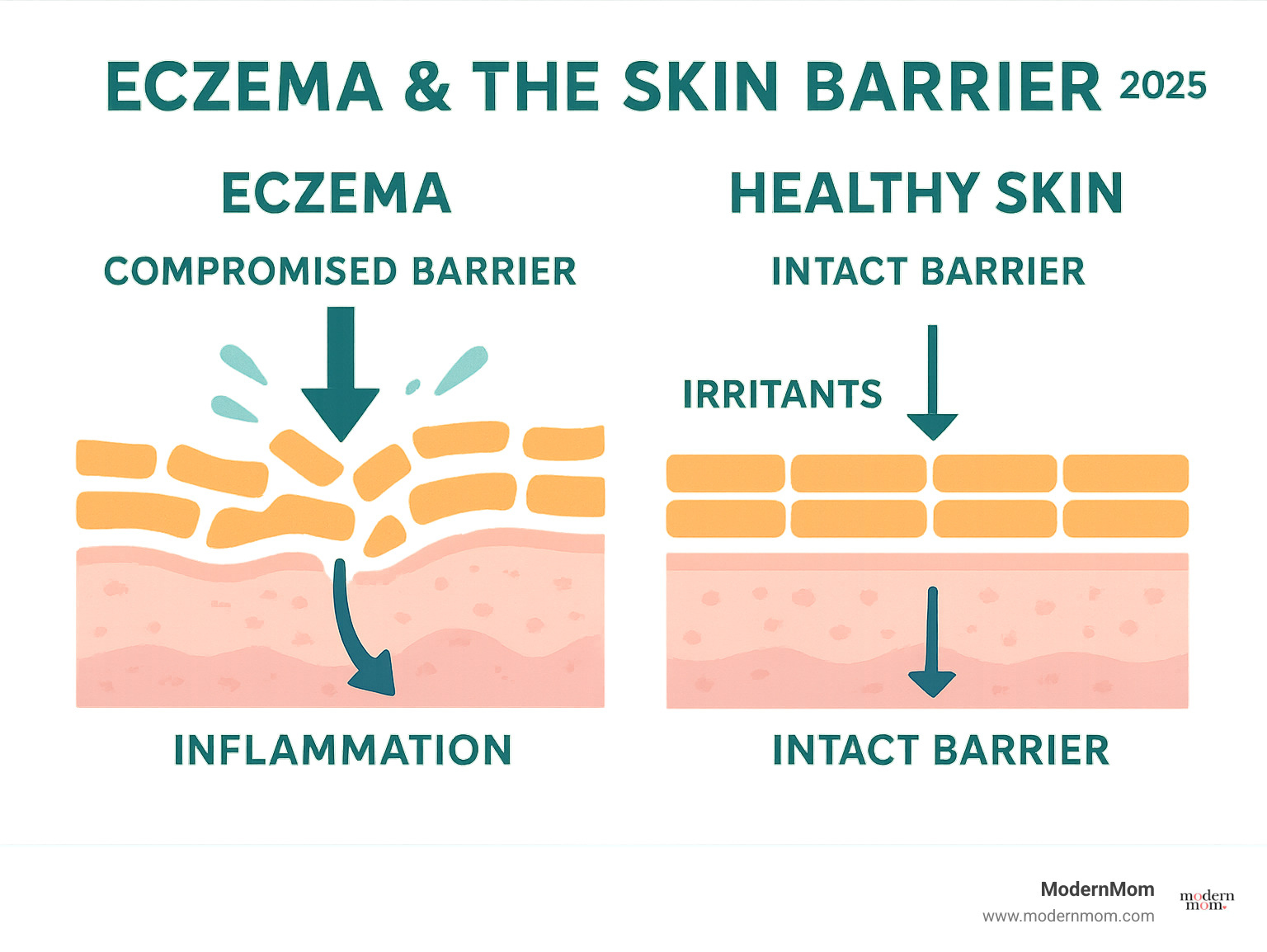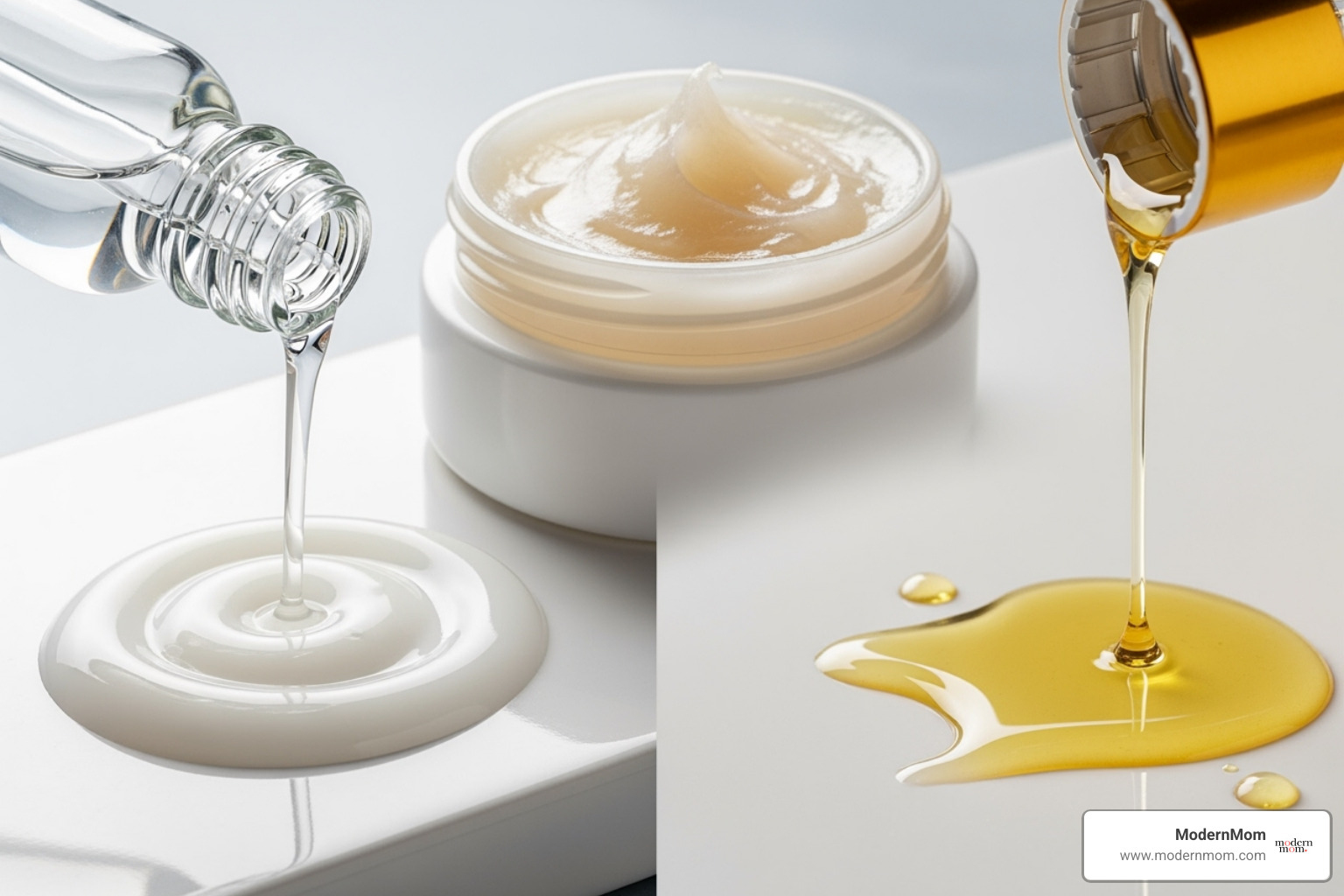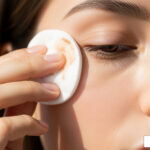
Why Finding the Right Makeup Remover Matters for Eczema-Prone Skin
Eczema friendly makeup remover options are essential for anyone whose skin reacts poorly to traditional cleansing products. If you need quick answers, here are the safest choices:
- Oil-based cleansers (sweet almond oil, jojoba oil)
- Cleansing balms without fragrance or essential oils
- Gentle micellar water (fragrance-free formulas)
- Cream cleansers with ceramides and glycerin
Avoid: alcohol, fragrance, sulfates, and harsh wipes that can trigger flare-ups.
If you have eczema, you already know how your skin can react to seemingly harmless products. One forum user shared their frustration: “Micellar water made my eye puff up really badly. Wipes also upset it. I only wear a bit of mascara, so don’t need anything hardcore.”
This experience isn’t uncommon. Eczema compromises your skin barrier, making it more sensitive to ingredients that others might tolerate easily. When your skin barrier is weakened, even gentle-sounding products can cause redness, burning, or worse flare-ups.
The good news? You don’t have to choose between wearing makeup and having calm skin. With the right products and gentle techniques, you can remove makeup effectively while actually supporting your skin’s healing process.
Many dermatologists now recommend oil-based removers and fragrance-free formulas specifically because they work with eczema-prone skin instead of against it. These products can dissolve makeup without the harsh rubbing or chemical irritants that trigger reactions.

Understanding Your Skin’s Needs: Ingredients to Look For and Avoid
When you’re dealing with eczema, reading ingredient labels becomes second nature – and honestly, it can feel overwhelming at first. But here’s the thing: once you know what to look for (and what to run from), shopping for skincare becomes so much easier.
Think of your eczema-prone skin like a friend who’s having a really tough day. You wouldn’t overwhelm them with chaos – you’d offer comfort, hydration, and gentle support. That’s exactly what we want from our eczema friendly makeup remover: products that cleanse without drama and actually leave our skin feeling better than before.
The goal isn’t complicated. We want to remove makeup effectively while keeping our skin barrier happy and hydrated. When our skin barrier is compromised (which it often is with eczema), even ingredients that sound gentle can cause irritation. Making informed choices about what we put on our face can mean the difference between a calm evening and an unexpected flare-up. Just like when you need to soothe red and irritated skin after a Brazilian wax, gentle care is everything.
Soothing & Hydrating Ingredients to Look For
The best ingredients for eczema-prone skin are like that friend who always knows exactly what to say. They’re reliable, comforting, and they actually make things better.
Glycerin is your skin’s best friend – seriously. This powerhouse ingredient pulls moisture from the air straight into your skin, helping to rebuild and maintain that protective barrier we desperately need. Scientific research on glycerin’s role in skin hydration backs up what many of us have experienced firsthand: it really works.
Hyaluronic acid might sound intimidating, but it’s incredibly gentle. Think of it as a tiny sponge that can hold up to 1,000 times its weight in water. It delivers intense hydration without any heaviness or stickiness – perfect for those of us who need moisture but can’t handle rich, heavy formulas.
Ceramides are like the building blocks your skin has been missing. With eczema, our natural ceramide levels are often lower, which weakens our skin barrier. Products with ceramides help patch up those gaps, making our skin stronger and better at keeping moisture in and irritants out.
Plant oils work beautifully because they use the “like dissolves like” principle – oil-based makeup melts away easily without harsh rubbing. Sweet almond oil is incredibly gentle and moisturizing. Jojoba oil is technically a wax that mimics our skin’s natural oils, making it compatible with almost everyone. Sunflower oil brings vitamin E and essential fatty acids to the party, often working well even for very sensitive skin.
When you’re shopping, look for products with short, simple ingredient lists. Sometimes less really is more, especially when your skin is already feeling overwhelmed.
Common Irritants to Avoid in a Makeup Remover
Now for the not-so-fun part – the ingredients that can turn a simple makeup removal routine into a skin disaster. Don’t worry though; once you know what to avoid, it becomes automatic.
Fragrance is probably the biggest troublemaker. Even if it smells amazing, fragrance (whether natural or synthetic) is one of the most common causes of skin reactions. Many moms with eczema have learned this the hard way – that lovely lavender-scented cleanser that seemed so relaxing can actually trigger a painful flare-up.
Drying alcohols like ethanol or isopropyl alcohol are like that friend who always brings drama. They strip away your skin’s natural oils, leaving your already-compromised barrier even more vulnerable. (Don’t confuse these with fatty alcohols like cetyl alcohol, which are actually moisturizing and totally fine.)
Sulfates – specifically SLS and SLES – create that satisfying foam, but they’re way too harsh for sensitive skin. They can disrupt your skin barrier and leave you feeling tight and irritated.
Essential oils might seem natural and gentle, but they’re actually highly concentrated plant extracts that can cause serious reactions. Tea tree oil, lavender oil, citrus oils – they might work for some people, but they’re risky for eczema-prone skin.
Artificial dyes and harsh preservatives are just unnecessary risks. They don’t help your skin in any way, and they can definitely hurt it.
Even products labeled “for sensitive skin” can contain these irritants, so always flip that bottle over and check the ingredient list. Your skin will thank you for taking those extra few seconds to read the fine print.
The Best Types of Eczema Friendly Makeup Remover
Let’s be honest – finding the perfect makeup remover when you have eczema can feel overwhelming. It’s like trying to find that perfect balance between getting your makeup off completely and not triggering a flare-up in the process.

The truth is, there’s no single eczema friendly makeup remover that works for everyone. Your skin might love what makes your friend’s face angry and red. But understanding the different types available can help you make the best choice for your unique needs and makeup routine.
Cleansing Oils & Balms: The Hydrating Powerhouses
If you’re dealing with stubborn waterproof mascara or long-wearing foundation, cleansing oils and balms might become your new best friends. These gentle powerhouses work on a simple but brilliant principle: like dissolves like. The oils in your remover naturally bind to the oils in your makeup and on your skin, lifting everything away without the harsh scrubbing that can irritate eczema.
Here’s what makes them special for sensitive skin. You apply them to dry skin and gently massage – no tugging or pulling required. When you add a little tepid water, most oils and balms emulsify into a milky texture that rinses away cleanly, taking your makeup with it.
The real magic happens because these formulas don’t strip your skin’s natural moisture. Instead of leaving your face tight and dry like some traditional cleansers, oils and balms leave your skin feeling soft and hydrated. For those of us dealing with eczema, this moisturizing boost is like a gentle hug for our skin barrier.
Many moms find success with simple plant oils like sweet almond oil, jojoba oil, or sunflower oil. These work beautifully and often contain minimal ingredients, which is perfect when you’re trying to avoid potential irritants. You might even find that using a gentle cleansing oil improves your overall skin texture over time. More info about Jasmine Oil Serum
Micellar Waters: The Gentle Liquid Option
Micellar water has become incredibly popular, especially among those with sensitive skin. The technology behind it is pretty fascinating – tiny cleansing molecules called micelles are suspended in soft water, acting like little magnets that attract dirt, oil, and makeup.
The appeal is obvious: you simply soak a soft cotton pad and gently sweep it across your face. Many formulas are designed to be no-rinse, making them perfect for busy mornings or late nights when you just want to get your makeup off quickly.
For light makeup days, micellar water can be wonderfully refreshing and gentle. It’s particularly nice if you prefer a clean, fresh feeling rather than the richer texture of oils.
However, here’s something important to keep in mind. While many people with eczema do well with micellar water, some experience irritation, especially around the delicate eye area. If you decide to try it, look for fragrance-free formulas and consider giving your face a quick, gentle rinse afterward to remove any residue.
Cream & Milky Cleansers: The Soothing Compromise
Sometimes you want something that feels more like a traditional cleanser but still treats your eczema-prone skin with kid gloves. That’s where cream and milky cleansers shine.
These low-foam formulas are wonderfully soothing because they don’t contain the harsh sulfates that create lots of bubbles but strip your skin. Instead, their creamy, milky texture feels like a gentle caress on irritated skin.
While they might not tackle heavy waterproof makeup as effectively as an oil or balm, cream cleansers are excellent for removing light foundation, blush, and everyday makeup. Many people love using them as the second step in a double cleansing routine – first the oil or balm to dissolve makeup, then the cream cleanser to ensure everything is clean without over-cleansing.
The hydrating texture of these cleansers means you’re not just removing makeup; you’re also giving your skin a dose of comfort and moisture. For eczema-prone skin that’s often crying out for gentleness, this can be exactly what you need.
| Type of Makeup Remover | Best For (Makeup Type) | Feel on Skin | Key Benefit for Eczema |
|---|---|---|---|
| Cleansing Oils & Balms | Heavy, Waterproof, Long-Wear | Nourishing, Hydrating, Soft | Dissolves makeup without stripping, moisturizes |
| Micellar Water | Light, Everyday | Refreshing, Clean | No-rinse convenience (but rinse for eczema), gentle on light makeup |
| Cream & Milky Cleansers | Light, Everyday | Soothing, Hydrating, Comfortable | Low-foam, non-stripping, ideal for sensitive skin |
How to Remove Makeup Without Triggering an Eczema Flare-Up
When you have eczema, removing makeup isn’t just about getting clean – it’s about protecting your skin from another potential flare-up. The way we cleanse can either nurture our delicate skin barrier or leave it feeling raw and irritated. Think of it as treating your face like the most precious silk scarf you own: with gentle care and plenty of patience.
The truth is, technique matters just as much as the product you choose. You could have the most gentle eczema friendly makeup remover in the world, but if you’re scrubbing away like you’re cleaning a stubborn pan, you’re setting yourself up for trouble. The Latest Breakthroughs in Skincare and Its All Natural! shows us that sometimes the gentlest approach is the most effective.
The Gentle Makeup Removal Technique

The golden rule for eczema-prone skin is simple: no rubbing, no tugging, no scrubbing. Instead, we want to coax that makeup off our skin with kindness and patience.
Start with clean hands – this might seem obvious, but it’s amazing how often we forget this basic step. Your hands carry bacteria and oils that could irritate your already sensitive skin.
If you’re using an oil or balm (which are often the gentlest options for eczema), apply it to dry skin first. This gives the product time to dissolve your makeup properly. Massage it gently with your fingertips, spending extra time around your eyes and lips where makeup tends to cling. You’ll actually feel the makeup melting away – it’s quite satisfying!
Here’s where the magic happens: wet your hands with a little tepid water and continue massaging. Watch as your oil or balm turns milky – this emulsification process helps everything rinse away cleanly. Hot water might feel good, but it strips your skin’s natural oils and can trigger irritation. Cold water won’t effectively remove the dissolved makeup.
When it comes to rinsing, thoroughness is key. Any leftover product can clog pores or cause irritation. If you prefer using a cloth, choose something incredibly soft like a clean microfiber cloth or makeup eraser towel. Press and lift rather than wiping back and forth.
For those days when you’re wearing heavier makeup or sunscreen, the double cleansing method is your friend. First, use an oil-based cleanser to break down all that stubborn makeup. Then follow with a gentle cream or milky cleanser to ensure everything is truly clean without over-stripping your skin.
The Importance of Patch Testing a New Eczema Friendly Makeup Remover
I know, I know – patch testing feels like such a chore when you just want to try that new product everyone’s raving about. But trust me, spending two days testing a small area is so much better than dealing with a full-face flare-up that lasts weeks.
Choose your testing spot wisely. The inner part of your arm near the elbow crease, behind your ear, or a small area on your jawline all work well. These areas are sensitive enough to give you a good indication of how your face might react.
Apply the product just as you would use it – if it’s a rinse-off product, rinse it off after the normal time. Then comes the hard part: waiting 24 to 48 hours while watching for any signs of trouble.
Your skin will tell you pretty clearly if something’s wrong. Redness, itching, stinging, burning, or any new bumps are all red flags. If you notice any of these, wash the area gently and skip that product entirely. But if your test patch stays calm and happy, you’re probably good to go.
Just because a product works for your friend with eczema doesn’t mean it’ll work for you. Our skin is as individual as we are, and what soothes one person might irritate another.
Aftercare: Soothing Your Skin Post-Cleanse
The moments right after cleansing are crucial for eczema-prone skin. This is when your skin barrier is most vulnerable, and also when you have the best opportunity to lock in moisture and comfort.
Pat, don’t rub when drying your face. Use a clean, soft towel and gentle pressing motions. Leave your skin slightly damp – this isn’t the time for that completely dry feeling.
Here’s the most important step: apply moisturizer immediately, ideally within three minutes of cleansing. This technique, sometimes called “wet skin moisturizing,” helps trap that water on your skin’s surface and prevents the moisture loss that often happens after cleansing.
Choose a moisturizer that your skin already loves – this isn’t the time to experiment. Look for those same gentle, hydrating ingredients we talked about earlier: glycerin, ceramides, and plant oils. Your skin will drink up that moisture and thank you with fewer flare-ups and more comfort.
This simple aftercare routine creates a protective cocoon around your newly cleansed skin, helping it stay calm and balanced. It’s like giving your skin a gentle hug after the work of makeup removal is done.
Frequently Asked Questions about Makeup Removal and Eczema
As a mom dealing with eczema-prone skin, you probably have a million questions running through your head every time you reach for a new product. Will this irritate my skin? Is it worth the risk? What if it makes things worse?
We totally get it. Managing eczema while trying to look and feel your best can feel overwhelming. That’s why we’ve gathered the most common questions we hear from moms just like you, along with expert-backed answers to help you make informed decisions about your skincare routine.
What’s the difference between a makeup remover and a regular cleanser?
This question comes up all the time, and honestly, it’s one of the most important things to understand when building an eczema-friendly routine. Think of it this way: they’re like different tools in your skincare toolbox, each with its own special job.
Makeup removers are the heavy lifters. Their main purpose is breaking down and dissolving all those stubborn cosmetics – your waterproof mascara, long-wear foundation, and that sunscreen you hopefully remembered to apply this morning. They’re specially formulated to bind to pigments and oils, literally melting away the day’s “armor” of products. Oil-based removers work on that “like dissolves like” principle we talked about earlier, making them incredibly effective at tackling even the most stubborn formulas.
Regular cleansers, on the other hand, are more like your daily maintenance crew. They remove the lighter stuff – dirt, sweat, pollution, and any remaining traces of impurities. They’re designed to cleanse your actual skin, preparing it for all those lovely serums and moisturizers you’re about to apply.
Here’s where it gets interesting for us eczema moms: these two often work beautifully together in what’s called a double cleanse routine. You start with your eczema friendly makeup remover (usually an oil or balm) to break down the heavy-duty stuff, then follow with a gentle cream or milky cleanser to make sure everything’s thoroughly removed without stripping your precious skin barrier.
This tag-team approach ensures your skin is perfectly clean and ready to absorb any eczema treatments or rich moisturizers you need, without any harsh scrubbing or irritation.
Are there any natural or DIY makeup removers safe for eczema?
Oh, this is such a great question! Many moms find that when commercial products keep letting them down, going back to basics with natural options can be a game-changer. The key word here is can – because as we all know, eczema is incredibly personal, and what works miracles for your friend might not work for you.
Pure plant oils can be absolute lifesavers for sensitive skin. Sweet almond oil, jojoba oil, sunflower oil, and even good old coconut oil have helped countless moms gently remove their makeup without irritation. Some women with severe eyelid eczema swear by using a tiny bit of Vaseline to remove stubborn mascara – it sounds unusual, but it can be incredibly gentle and effective.
The application is simple: put a small amount on a cotton pad or your clean fingertips, then gently massage over your makeup. Watch it melt away like magic! For more natural approaches to personal care, you might enjoy reading about Homemade Herbal Nail Care.
But here’s where we need to be smart about it. First, make sure you’re using high-quality, pure, cold-pressed oils without any sneaky additives or fragrances that could trigger a reaction. Some oils, like coconut oil, might clog pores for certain people, especially if you don’t follow up with a gentle water-based cleanser.
The golden rule still applies: patch test everything! Even the most natural, gentle-sounding oil needs to prove itself on a small patch of your skin before you trust it with your entire face. Your inner arm or behind your ear are perfect testing spots.
While oils are fantastic at dissolving makeup, they might not remove absolutely everything, especially if you wear heavier makeup or have oily skin. Following up with a gentle cleanser often gives you the best of both worlds.
Can an eczema friendly makeup remover actually improve my skin?
This is honestly one of our favorite questions because it shows you’re thinking beyond just “surviving” your skincare routine – you want to thrive!
Let’s be real: the primary job of any eczema friendly makeup remover is to be completely neutral. We want it to do its job without causing drama, irritation, or those dreaded flare-ups that can ruin your whole week.
But here’s the beautiful thing – when you choose the right product and use gentle techniques, it can absolutely support your skin’s healing journey in some pretty amazing ways.
Think about all the stuff that builds up on your face throughout the day: makeup, pollution, excess oil, and environmental irritants. These can all sit on your sensitive skin like unwelcome guests, potentially making your eczema worse or clogging your pores. A gentle, effective remover sweeps all of this away, giving your skin the clean slate it desperately needs.
Even better, proper cleansing creates the perfect foundation for all your eczema treatments and moisturizers to work their magic. When your skin is thoroughly but gently cleansed, those expensive serums and prescribed treatments can actually penetrate and do their job instead of sitting on top of a layer of leftover makeup.
By choosing non-stripping, hydrating formulas and using those gentle massage techniques we talked about, you’re actively supporting your skin’s delicate moisture barrier. This prevents the dryness and damage that harsh removers cause, which helps keep eczema flare-ups at bay.
Plus, let’s not forget about preventing breakouts and irritation. Leaving makeup on too long is like inviting trouble – clogged pores and irritation are the last things your eczema-prone skin needs to deal with.
So while your makeup remover isn’t going to cure your eczema, it’s absolutely a crucial supporting player in keeping your skin healthy, calm, and ready to heal. It’s all about setting yourself up for success, one gentle cleanse at a time.
Conclusion
Finding the right makeup removal routine when you have eczema doesn’t have to feel like solving a puzzle with missing pieces. Yes, it takes a bit more thought and care than grabbing whatever’s on sale at the drugstore, but once you find your rhythm, it becomes second nature.
Think of it this way: you’ve already mastered so many things as a mom that seemed impossible at first. Remember learning to change a diaper while your baby was doing acrobatics? Or figuring out which cry meant “hungry” versus “tired”? This is just another skill in your toolkit.
The beauty of finding an eczema friendly makeup remover that works for you is that it opens up possibilities. You don’t have to choose between looking put-together and having comfortable skin. You can have both.
Your skin barrier is like your home’s foundation – when it’s strong and well-maintained, everything else works better. The gentle ingredients we’ve talked about, like glycerin and plant oils, are like giving that foundation the support it needs. Meanwhile, avoiding harsh ingredients like fragrance and alcohol is like protecting it from damage.
The gentle techniques matter just as much as the products themselves. Those soft, patient movements might feel slower than your old routine, but think of them as a few minutes of self-care in your busy day. It’s a small act of kindness toward yourself.
Patch testing isn’t just a suggestion – it’s your safety net. Your skin’s reactions are valid information, not inconveniences. Trust what your skin tells you, even if a product worked miracles for your best friend.
At ModernMom, we know you’re juggling a million things, and skincare shouldn’t add stress to your life. Finding a safe routine for makeup removal is one less worry on your plate. When your skin feels calm and comfortable, you can focus on all the other beautiful chaos that comes with being a mom.
Your eczema-prone skin isn’t a limitation – it just means you’re more selective about what you put on it. And honestly? That’s not such a bad thing. Find more beauty hacks for busy moms that work with your real life, not against it.
The post Eczema & Makeup Removal: Tips for Soothing Your Skin appeared first on ModernMom.


